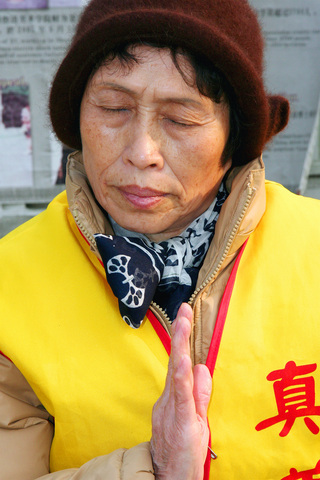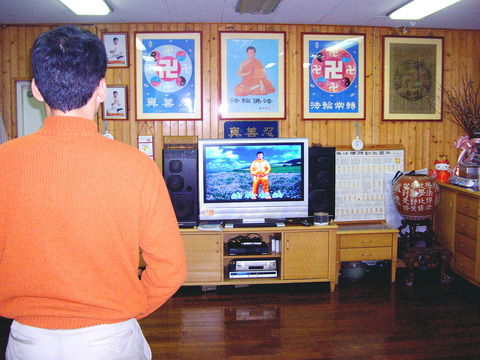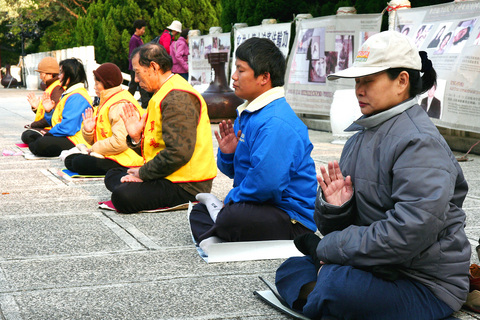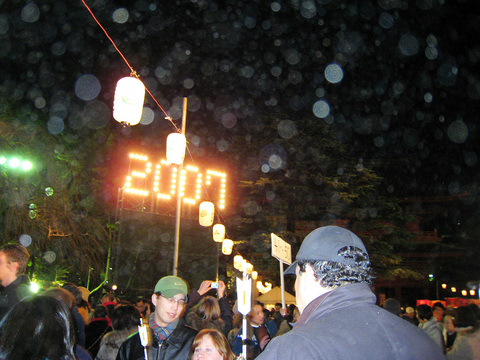I was warned before joining Falun Gong (法輪功) that if I resisted the brainwashing and wrote a negative story the organization would put me on its blacklist. If I wrote a positive article, a colleague said, the Chinese government would be annoyed and put me on their blacklist. Either way it appeared to be a no-win situation.
According to the Taiwan Falun Dafa Association it has 300,000 members and a lot of clout. For instance, at its behest, 84 legislators pushed for a resolution in May last year asking the UN to investigate China's "persecution" of Falun Gong. The association claims over 100 million practitioners in over 60 countries. As for the Chinese government it was so upset about a rally Falun Gong held near the Communist Party's headquarters in 1999 it banned the organization, fearing "a serious ideological and political struggle."
Even so, on the first of this month, I made my way to a nondescript bookshop on Chongqing North Road in Taipei and asked if I could join Falun Gong. The store owner directed me up a winding staircase to a room where a group of people was sitting in a circle reading aloud. I was then sent to another location, across town, at a small house off Minquan East Road, which was where my induction to the cultivation of Li Hongzhi's (李洪志) "great law" (法輪大法) would take place.

PHOTO: JULES QUARTLY, TAIPEI TIMES
Day One
I was late walking into the wood-paneled parlor, with its prominent, framed pictures of the Falun Gong leader. Five people were sitting on mats intently watching a large flat-screen television. A man in a yellow jump suit fringed with orange was demonstrating what appeared to be taichi exercises. He floated against the computer-generated background of a field of violets and the image shimmered slightly as lorries rumbled by. This avatar of Li was going to be my leader for the next nine evenings.
It was a mundane experience to begin with. Two women, the group leaders, could not work the TV and Li's lecture competed with announcements about trash collection on the neighborhood tannoy outside. It was uncomfortable sitting on the floor for 90 minutes with just a short break as Li introduced his system in a series of videoed lectures that he gave in Guangzhou, China, 1996.

PHOTO: JULES QUARTLY, TAIPEI TIMES
These teachings have been collected into a nine-chapter book called Zhuan Falun: Turning the Law Wheel (轉法論), in which Li says, "Only Buddha law can completely unveil the mysteries of the universe, of space-time and of the human body." He claims qigong (氣功) or "breath/energy work" is 7,000 years old and is a system of cultivating the law, which involves being true (真), good (善) and able to endure (忍). He also says there were human civilizations over 100 million years ago. He compares himself to a great, enlightened being and equates homosexuals and drug addicts with murderers.
Like most Taiwanese and many Chinese, Li essentially believes in a mixture of Buddhism and Daoism. But he is a fundamentalist. He defines Falun Gong in opposition to the modernization and liberalization of China in the 1990s, as opposed to the 1950s and 1960s. "Mankind's moral standard is on a big downslide, the world is going to the dogs, people are just controlled by greed." He suggests the end is nigh and only his law can "save" us, while railing against false prophets.
Day Two

PHOTO: JULES QUARTLY, TAIPEI TIMES
After meditation exercises we settled on the floor for Li's second sermon, which was about opening our third eye, "located slightly above the spot that's between your eyebrows, and … connected to the pineal gland." Li stated, "I don't do healing" for "ordinary people" but later claimed Falun Gong could make unhealthy people better or prevent them becoming sick. He also said it made a 70-year-old woman look 40.
This set off a breathless discussion about the miracles of Falun Gong. One of the teachers told us a story about a man in Lugang, Changhua County (彰化縣鹿港), who had a nasty skin disease. He joined Falun Gong and was cured. "Wow!" everyone said, seemingly believing every word.
Day Three

PHOTO: COURTESY OF A.C. CHUANG
I confess. I had a beer before class, performed my exercises incorrectly and was unable to concentrate on Li's lecture, which dealt with demons, the inability of animals and "law wheels" that protect us from life threatening situations, like steel rods falling from buildings. When Li made a point the TV audience clapped in unison. It sounded like an effect because it started and ended so quickly and didn't vary. Even so, Li acknowledged the applause with a gesture that was like praying with one hand.
One of the initiates conveniently found a book on the shelf called Nine Criticisms of the Communist Party
This is the official Falun Gong line and the organization has become a lightning rod for anti-Chinese sentiment since Li emigrated with his wife and daughter to the US in 1997. Media outlets such as Minghui Radio Station, Epoch Times and New Tang Dynasty Television (NTDTV) claim to be independent but are backed by Falun Gong and are virulently anti-Communist. The Web site www.clearwisdom.net carries statements from Li, the latest of which (Feb. 28, 2007) called on believers to, "disintegrate completely all the meddling deities" [i.e. the Chinese authorities].
"Even the Taiwan press doesn't dare write stories about Falun Gong and if it does it gets it wrong," our teacher said. I asked if the Chinese and Taiwan governments and media were colluding against Falun Gong, but she didn't answer and changed the subject.
Day Four
During a break one of the students, a young businessman, said he went to China two years ago in search of his fortune, but instead discovered people were evil. He said he was disenchanted with life and was inspired by Falun Gong after a visit to Tokyo with his girlfriend to celebrate New Year. Photos of the countdown had "law wheels" in them.
The law wheel is a mandala, a circular figure representing the universe in Buddhist symbolism. The Falun Gong emblem is also a mandala with a wan (萬) icon (inverted swastika) in the middle, surrounded by smaller taichi symbols and swirling wans. The young businessman said a photographer confirmed the images were not manipulated and another friend, who was into Falun Gong, had suggested the law wheels were a sign he should join too. To me they looked like the effect of light on dust from fireworks, but to everyone else they were law wheels, as plain as the nose on my face.
Day Five
In our class there were five initiates, including myself, two teachers and two Falun Gong graduates. One of the latter was a university student and said she was attending for "deep intellectual and emotional" reasons. Her mother was also a member. There was a couple who were designers and said they had checked out other religions but had not found what they were looking for. There was also an old guy recovering from an operation. He was hoping Falun Gong could help him regain his health and his wife was already a member.
We were past the halfway stage of our initiation and today we would learn the final set of five exercises, which so far have been like aerobics-lite. The first was called "Buddha showing a thousand hands," which involved stretching our arms out, flexing and then returning to position. Others, like "Falun heavenly circuit," were said to open our meridians, or the channels through which energy flows.
The final exercise was the most difficult because we had to sit in the lotus position. Of the five initiates just two of us managed to cross our legs in the approved position — and not for very long. But, as our master avatar said, "To cultivate in meditation, you have to cross your legs for a long time, and once they're crossed, your legs ache and feel like pins and needles. … The reason is, when the legs hurt, we can see that the black matter is attacking the legs. The black matter is karma, and suffering eliminates karma and turns it into virtue."
Martial arts master He Jing-han (何靜寒), who teaches bagua quan (八卦拳), said the exercises were helpful, but many people joined Falun Gong because they were sick or needed help and ended up believing in Li rather than themselves.
"These qigong exercises can give you confidence but after you have mastered them you should move on. The problem is many people do not have confidence in themselves. Not having confidence in oneself is the opposite of Buddhism, which is about faith in oneself. Falun Gong is about having faith in another. This is not so good."
Day Six
I asked the young businessman why Falun Gong referred to itself as Falun Dafa (法輪大法), or the "great law wheel." He replied that "gong" was just an excuse so the organization could develop in China. "Fa is the point," he said. A teacher then jumped in and said the organization was Falun Dafa and it practiced falun gong.
At the time this seemed sinister and after class a friend said the group was like the Scientologists. They would find out my strengths and exploit my weaknesses, plot my downfall if I wrote a critical article and even kidnap me, he said. Each TV lecture was introduced by spinning law wheels and I wondered if this was part of the brainwashing process. Were there subliminal messages? The teachers asked for my phone number and e-mail, which I gave them, but not my address. Perhaps they would make crank calls or spam me to death?
Day Seven
Before class another friend said he met some Falun Gong practitioners in Bali, where he was on holiday. They were doing exercises on the beach and were "normal, certainly not fools." He said a cynical journalist like me wasn't likely to get brainwashed and he was right. I no longer felt paranoid. I could hold the lotus position longer and the exercises were, on the whole, pleasant to perform and promoted a sense of wellbeing.
The older guy, who hadn't said much, told us he couldn't manage one exercise at the start but was now able to bend down. His wife showed us a thick book of photos full of law wheels circling above meditating practitioners. There was a palpable enthusiasm that was infectious and an almost competitive desire to "report" positive things about Falun Gong. One of the teachers said a 30-year-old man who couldn't sweat suddenly did so after six days of exercises.
Day Eight
Li was in a relaxed mode for his televised lecture today. His wore his dark suit, as normal, but his sleeves were rolled down and his tie was off. A senior teacher, a man, took us through an exercise session and we found we could sit in the lotus position for longer. "The more pain the more good," one student said, quoting Li's teachings.
Day Nine
After our exercises and the final lecture we formed a circle and were led by the senior teacher in a debriefing session. We gave our reasons for coming and were asked whether we would continue to attend. The two designers said they had learned a lot but were undecided. The young businessman seemed converted and said the exercises had made him sweat, proof that he was eliminating karma and turning it into virtue. The old guy had no choice but to carry on if his health was improving as miraculously as he said, particularly since his wife was a member.
Then it was my turn. I said everyone seemed nice and the exercises were cool but I was not a believer. This was accepted with a shrug of resignation. I had already confessed to being a writer and I think they knew I was a lost cause. So I asked them how Falun Gong was funded since instruction was free and they had the use of this house and they published copies of the Epoch Times.
There was a bit of choking, but eventually they said the house belonged to a Falun Gong member and the paper was published free of charge by another member who had a printer. Li told followers in 1999 he "basically" lives off the royalties from his books. He bought a US$580,000 house in 1999, according to the Wall Street Journal. Even so, money did not seem to be the main thrust of Falun Gong. If it was this would be "practicing in an evil way," according to Li.
The major religions, or subdivisions thereof, have at times been called cults so the point is whether they are evil or benign — unless one is anti-religion. The Communist Party of China (CCP) insists Falun Gong is an "evil cult" that is political in nature and encourages its members to refuse hospital treatment and thereby die and even immolate themselves. But the CCP constitution does provide "freedom of religion," albeit with restrictions. It is strange that Chinese can worship Christ or Mohammed but not practice a homegrown belief system.
Falun Gong did not seem to be an evil cult but Li's anti-Chinese rhetoric is baffling since he's claiming the high ground and his organization is supposed to be spiritual rather than political.

Climate change, political headwinds and diverging market dynamics around the world have pushed coffee prices to fresh records, jacking up the cost of your everyday brew or a barista’s signature macchiato. While the current hot streak may calm down in the coming months, experts and industry insiders expect volatility will remain the watchword, giving little visibility for producers — two-thirds of whom farm parcels of less than one hectare. METEORIC RISE The price of arabica beans listed in New York surged by 90 percent last year, smashing on Dec. 10 a record dating from 1977 — US$3.48 per pound. Robusta prices have

A dozen excited 10-year-olds are bouncing in their chairs. The small classroom’s walls are lined with racks of wetsuits and water equipment, and decorated with posters of turtles. But the students’ eyes are trained on their teacher, Tseng Ching-ming, describing the currents and sea conditions at nearby Banana Bay, where they’ll soon be going. “Today you have one mission: to take off your equipment and float in the water,” he says. Some of the kids grin, nervously. They don’t know it, but the students from Kenting-Eluan elementary school on Taiwan’s southernmost point, are rare among their peers and predecessors. Despite most of

The resignation of Taiwan People’s Party (TPP) co-founder Ko Wen-je (柯文哲) as party chair on Jan. 1 has led to an interesting battle between two leading party figures, Huang Kuo-chang (黃國昌) and Tsai Pi-ru (蔡壁如). For years the party has been a one-man show, but with Ko being held incommunicado while on trial for corruption, the new chair’s leadership could be make or break for the young party. Not only are the two very different in style, their backgrounds are very different. Tsai is a co-founder of the TPP and has been with Ko from the very beginning. Huang has

A few years ago, getting a visa to visit China was a “ball ache,” says Kate Murray. The Australian was going for a four-day trade show, but the visa required a formal invitation from the organizers and what felt like “a thousand forms.” “They wanted so many details about your life and personal life,” she tells the Guardian. “The paperwork was bonkers.” But were she to go back again now, Murray could just jump on the plane. Australians are among citizens of almost 40 countries for which China now waives visas for business, tourism or family visits for up to four weeks. It’s